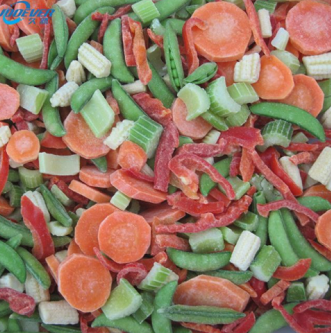Your reliable partner for frozen foods
As we all know, fruits and vegetables are high-quality sources of vitamins, minerals and fiber. The polyphenols (anthocyanins, flavonoids, etc.) contained in fruits and vegetables have been proven to reduce the risk of chronic diseases. However, due to the effects of microbial contamination, enzyme metabolism and oxidation, fruits and vegetables are extremely susceptible to spoilage. For nearly a hundred years, food scientists have been looking for and improving methods for storing fruits and vegetables and retaining their maximum nutritional value. Air-drying, canning, pickling, etc. are all effective storage methods, but they all change the texture and flavor of the food itself and even greatly weaken the nutritional value. So, in addition to retaining the freshness of fruits and vegetables for a long time, can the quick-freezing technology also retain their nutritional value? Let's take a look at the comparison of the nutritional status of specific quick-frozen fruits and vegetables and fresh fruits and vegetables.
Also as a water-soluble vitamin, VB in vegetables will lose 20-60% in the "quick freezing" pretreatment
Such fat-soluble nutrients will not be lost due to heating, but will increase. For example, the beta-carotene content of quick-frozen peas is higher than that of fresh peas; the beta-carotene content of quick-frozen corn has increased nearly twice. Interestingly, the lycopene content of canned tomato products is also higher than that of fresh tomatoes. The reason may be that the heating process causes more lycopene to be released.

The potassium content will be reduced, especially in quick-frozen spinach; the calcium and magnesium content will not be affected. This is because most of the potassium in vegetables is in the free state, and most of the calcium and magnesium are in the combined state, so in the pretreatment process, the calcium and magnesium are not easily reduced with the loss of water.
There is no difference in fiber, protein, and carbohydrate content between fresh fruits and vegetables and quick-frozen fruits and vegetables. The content of omega 3 fatty acids in frozen seafood was not affected either.
The data shows that the phenol content in quick-frozen carrot leaves is only 30% of fresh carrot leaves, while the oxygen radical absorbance capacity (ORAC) is only 12%. But the ability of quick-frozen cauliflower to absorb oxygen free radicals is no different from that of fresh ones.
The above are mainly the changes brought about by pretreatment. In the later storage process, according to different packaging and storage temperature, the nutrients are more or less reduced. Even large cherries stored at -23ºC, their anthocyanin content decreased by 87% after 6 months. Of course, the nutrient loss caused by later storage also appears in fresh fruits and vegetables. As mentioned above, after fresh green beans are kept in the refrigerator for one week, the loss of VC is as high as 77%.

Xiamen Jooever Import And Export Co.,Ltd is a leading supplier of high quality frozen food. Our wide and varied range includes frozen vegetables, frozen fruits, frozen berries and frozen mushrooms.
Jooever's reputation is founded on quality, service and reliability. We insist that our products are processed and packed under a HACCP program and complying with the industry's highest ISO and food safety standards.
When product is under packing, it is rigorously checked by Jooever QA team, so that Jooever can ensure that the product our customers receive is of the highest quality.
Work with us for the speed and flexibility to order only as many as you need right now. We can process your orders in just 13-15 days, and our monthly output 1000MT means we can fill most volume orders and offer lead times as short as 18-21 days.
To provide the best service to our clients. We reply to all inquiries in just 2 hours. Discover why we sell $5 million worth of frozen products in 2017 - Contact us today. Work with the frozen foods specialist.